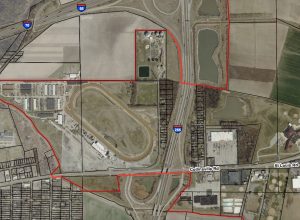Collinsville gives go-ahead for Southwest Corridors plan
Bob Pieper — August 4, 2016
The city of Collinsville is putting effort into the creation of a new Southwest Corridors develop district to help redevelopment of this area. (Map courtesy city of Collinsville)
Following years of controversies and revisions, the Collinsville City Council voted July 25 to move forward with a long-stalled plan to redevelop the town’s aging St. Louis-Collinsville commercial district.
Council members approved creation of a new Southwest Corridors develop district, encompassing the area, and a new, overlapping tax increment financing (TIF) district to support it.
Approval came on a three-two vote with Mayor John Miller casting the deciding vote and council members Nancy Moss and Jeff Krypta voting against the plan.
The redevelopment area extends from the grounds of the Fairmont Park racetrack to the Horseshoe Restaurant, and also includes a section of fronting property along Bluff Road.
City officials have not named developers interested in the area or businesses who might become tenants in the redevelopment district.
The TIF district will be supported by a new one cent retails tax on purchases in the shopping area, according to City Manager Mitch Bair. The sales tax will be applicable only in the development district, not citywide, Bair emphasized. Groceries will exempt, he said.
Sales tax revenues will be used for infrastructure improvements in the redevelopment area; mostly street and sidewalk upgrades, according to Miller. However, funds will also be used for the installation of fiber optic cable in redevelopment district, according to city documents.
Approval came after the city, over recent weeks, agreed to remove a number of parcels from the redevelopment and TIF districts. The TIF and development district plans were pulled from the council’s June meeting agenda at the last minute, to allow city hall staff to delete the parcels from the development plan.
Also clearing the way for approval of the development district: hold-harmless agreements under which the city will share some of the TIF funds with other local taxing entities — most of which had previously opposed the redevelopment plan.
Under a memorandum of understanding (MOU) with the Collinsville School District, the new fiber optic cable is used to facilitate internet access at an elementary school in the redevelopment area. That, in turn, will allow the school to provide state-of-the art online home study programs, according to the MOU. The city, however, will not pay for internet service at the school.
Critics of the redevelopment plan say it effectively threatens residents and businesses in the area, many of whom could now lose their homes or business locations due to increasing rents or eminent domain.
The redevelopment area included 541 residences — many home to retired persons, low-income individuals, or young families who may not have the desire or financial resources to relocate, critics say. Many residents and businesses have been in the area for years, they add.
Critics also charge Collinsville has become overly reliant on TIFs, burdening the city with high tax rates and long-term debt.
The city already has three TIF districts, implemented in a total of five phases.
Mayor Miller contends the existing TIFs were necessary to spur redevelopment of the city’s downtown area and allow construction of the Gateway Center, which spurred development of the surrounding Eastport Plaza office, hotel and dining area.
The new TIF similarly will be essential if the St. Louis-Collinsville Road area is to be revived, he contends.
The Collinsville City Council first proposed a TIF and redevelopment district plan for the area in 2008, but quickly tabled the effort in the wake of objections from local residents and a national downturn in the real estate market.
The plan approved last week was first introduced in 2012.
— Collinsville gives go-ahead for Southwest Corridors plan —







